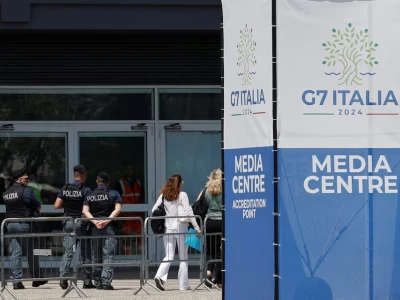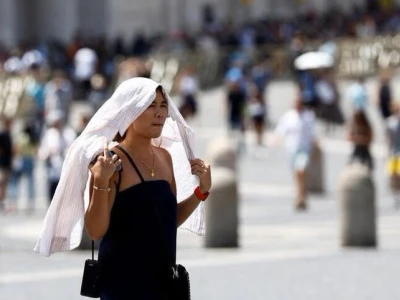
Super Mario could give weak EU a shot in the arm
If EU picks Super Mario, it would be a good indication they are prepared to do whatever it takes to create a stronger EU.
LONDON, June 10 (Reuters Breakingviews) - If all countries obeyed international rules, there would be little need for regional blocs. The United Nations Charter would ensure strong states did not bully, let alone invade, weaker ones. The World Trade Organisation would underpin fair play in international commerce.
But since this is not how the world works, smaller countries need to come together to protect themselves. This is even more pressing now that Russia has invaded Ukraine, and both China and the United States are undermining the global free trade system. If Donald Trump returns to the White House, relying on a rules-based international order will look even more quaint.
This is the geopolitical backdrop that the European Union, whose parliament has just held elections, is facing as it chooses its leaders for the next five years. The elections have strengthened nationalist parties and weakened French President Emmanuel Macron, the most vocal pro-European leader, so much that he has called national parliamentary elections.
That said, the traditional centre-right and centre-left parties have held their ground, so the EU's 27 member states may still be able to create a stronger union. If they are serious about doing so, they will consider picking Mario Draghi, who helped save the euro as president of the European Central Bank, to chair their discussions.
The official once known as “Super Mario” believes the EU must adapt to the new reality. In a speech, opens new tab in April he called for “radical change”, saying the EU’s “organisation, decision-making and financing are designed for ‘the world of yesterday’”. Draghi is putting the finishing touches to a soon-to-be-published report on how to boost the bloc’s competitiveness. This could almost serve as a personal manifesto for a top EU role, though the Italian said, opens new tab in 2022 that he does not want another big position.
The EU has two particularly senior jobs. Traditionally the most powerful is president of the European Commission, the bloc’s executive arm. Ursula von der Leyen, the current incumbent, is favourite to continue in that role, as she was also the lead candidate for centre-right European People’s Party which is expected to hold the most seats in the new parliament.
The other top post is president of the European Council, the decision-making body for the EU’s 27 national leaders. This could be unusually influential in the coming years. While Draghi has the credentials for either position, the latter one probably suits him best.
BLOC BUILIDNG
Although the EU calls itself a union, it is far from united. It is too fragmented and doesn’t have sufficient pooled financial resources. This is partly because national governments have kept much of the power to themselves. Every state can pursue its own foreign and defence policy. EU governments have often taken different approaches, as during the U.S. invasion of Iraq in 2003.
Although the EU came together in response to Russia’s invasion of Ukraine, it has been slow to ramp up its defence industry and has sometimes squabbled over what to do. Moscow could still prevail – a scenario that would shake the EU to its core.
Even the union’s single market, where a form of supermajority voting by member states has helped to break down national barriers, is far from perfect. It does not include three key industries: capital markets, energy and electronic communications.
What is more, the EU budget requires the unanimous approval of the 27 national governments. This helps explain why the budget of 160-180 billion euros, opens new tab a year is equivalent to just 1% of the EU’s economic output.
The EU will need more collective financial firepower if it is going to reinforce its position. Its defence industry will need to be larger and more integrated, while the bloc will also need funds to help rebuild a war-ravished Ukraine. It will require a targeted industrial policy to compete with both China and the United States, whose subsidies to high-tech and green industries threaten to marginalise EU-based businesses.
WHY DRAGHI?
This is where Draghi could come in. He offers a unique package of experience and talents, which could enable him to coax the 27 states into agreeing to take a leap forward together.
Draghi’s record at the ECB gives him financial and economic credibility. Saving the euro was a technical feat and a brilliant communication job when he pledged to do “whatever it takes” to rescue the single currency. But it also required deft behind-the-scenes networking, principally with Germany’s then Chancellor Angela Merkel, to ensure that the euro zone’s largest economy did not torpedo the plan.
Draghi is a skilled pragmatist, who uses his expertise across multiple areas to find solutions to complex problems. Although he is not a conventional politician, he is acutely alive to what is politically possible.
As Italian prime minister, Draghi played a central role, opens new tab in the decision by developed countries to freeze Russian assets at the start of the Ukraine crisis. He believes in a strong EU as part of a strong Western alliance. In other words, he is much more than an economist.
Draghi could, in theory, push his agenda to create a more unified bloc from either the European Council or the European Commission. But since the central task is to get national leaders to agree, the former role may better suit the 76-year-old.
None of this means national leaders will choose him, though. They typically give the top jobs to members of one of the EU’s main political groupings. If centre-right von der Leyen becomes president of the Commission, there will be strong pressure to put a centre-left politician such as Danish Prime Minister Mette Frederiksen or former Portuguese premier Antonio Costa in charge of the Council. Draghi’s lack of electoral credentials – ordinary voters have never chosen him for any position – could count against him, but might also help him appeal to leaders across the political spectrum.
The EU’s 27 prime ministers and presidents may ultimately reject Draghi because they do not want to centralise more power. If they pick Super Mario, however, it would be a good indication they are prepared to do whatever it takes to create a stronger EU.
Related
Related

China has an incentive to keep road to Europe open

Russia calls out Ukraine allies at UN for silence on Kursk assaul

Troubled G7 leaders focus on Ukraine war, China in Italian summit

